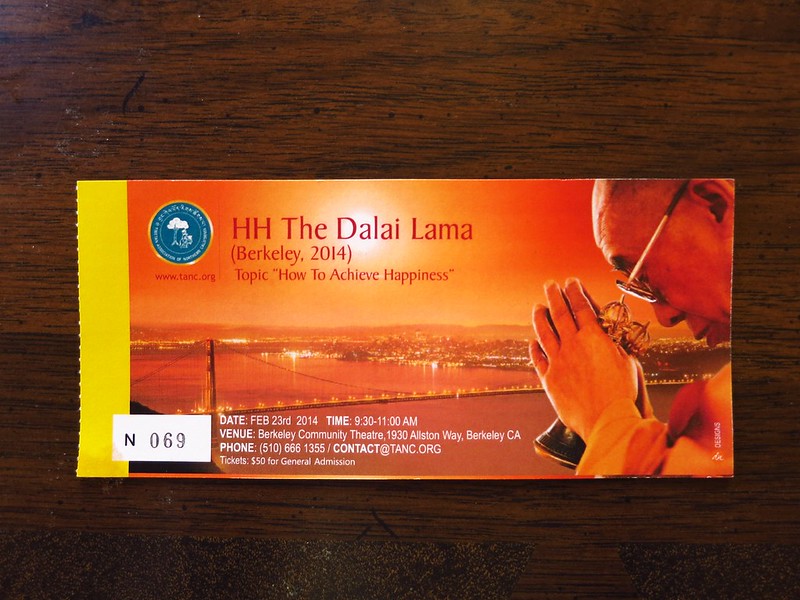
There were no cameras allowed at the Dalai Lama talk. No computers. No cell phones. No photographic instruments of any kind. What was allowed? Babies. The kind that scream. There were a few of those, and then there I was at the very back of the balcony, with a notebook and a pen.
I just want to give a little background to what I am about to share, so you can add a little salt to this post, in place of an absolute truth.
The Dalai Lama is the reincarnation of the Buddha of compassion. His topic was a good one: How to Achieve Happiness. Happiness is a buzz word: it grabs most people's attention, and if you attach "how to" anywhere near it, you pretty much have a captive audience.
He had about one hour to answer this elusive question, and to also fit in a brief audience Q & A. So what he provided were his conclusions, and then some supporting stories.
My notes follow below in red, but before I write down what he said, I want to take a moment to describe the Dalai Lama, just the visual impression, because if you just sit and observe, and watch him as he speaks, there is a lightness in him. He's joyful. He has a really good sense of humor. When he talks about happiness, he also happens to embody it.
Here are my notes:
My notes follow below in red, but before I write down what he said, I want to take a moment to describe the Dalai Lama, just the visual impression, because if you just sit and observe, and watch him as he speaks, there is a lightness in him. He's joyful. He has a really good sense of humor. When he talks about happiness, he also happens to embody it.
Here are my notes:
Focus on others and oneness, rather than self:
"A self-centered attitude is contrary to happiness… mentally, emotionally, spiritually, we are the same."
"We are social animals, we need to work together in a oneness of humanity."
"If there is too much emphasis on the self, you make yourself a prisoner. The oneness of humanity is very essential."
"We all come from the same God. Everyone has the spark of God. If you do good, you get the benefit."
Money does not lead to happiness:
"Money leads to physical comfort, but not happiness of the mind. Happiness depends on internal values."
He then told the story about his friend who lived in a small house by the side of a mountain. This man ate only bread and water. He spent his days in meditation. However, when you looked into his eyes, you saw that his eyes overflowed with happiness.
How do you reconcile the first notion that humans are social animals with this man's isolated happiness? I thought about this. It may be that meditation is a form of socialization. Through meditation, you connect to a universal truth, or oneness, and this connection is a social connection.
How do you reconcile the first notion that humans are social animals with this man's isolated happiness? I thought about this. It may be that meditation is a form of socialization. Through meditation, you connect to a universal truth, or oneness, and this connection is a social connection.
On Faith:
"The purpose of faith is to be more compassionate."
"It shows a lack of firm convictions if you want more edicts."
On Death:
"Death is changing old clothes. Change of body, not self. Self remains."
"When you liberate from ignorance and destructive emotion, that is salvation."
In the aftermath, I read my notes out loud to someone, who disagreed with pretty much every statement here. It didn't occur to me that these statements were controversial. I thought they sounded very simple, and wondered how I could apply while I was commuting to work or making dinner.*
What do you think? Is this useful?
*As an aside here, there was also a huge protest outside the building where the talk took place. People were chanting for the Dalai Lama to give and stop lying. I can't help thinking that there are better ways to spend your Saturday morning.

No comments:
Post a Comment